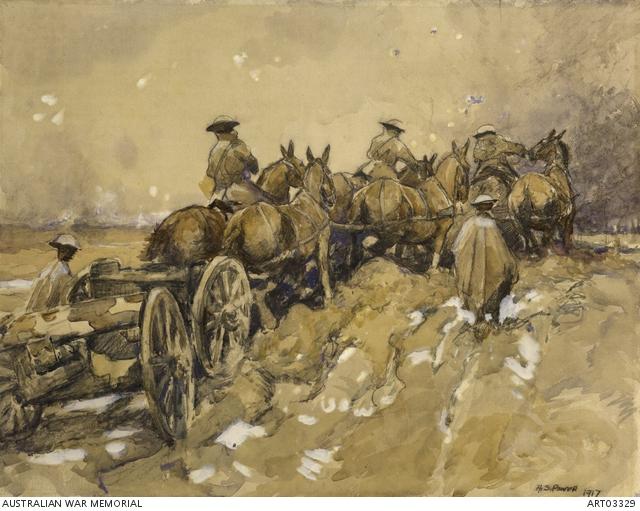The Drivers
The following extract is from C. E. W. Bean’s Official History, Volume IV, pp 729-730. It highlights an often overlooked branch of the AIF during their most gruelling trial at Ypres during 1917.

From the August fighting [at Ypres in 1917], the Australian infantry was so fortunate as to be spared, but the detached artillery bore its share. That of the 2nd Division, whose new battery positions were north of Hill 60, now began to suffer severely, but the impact of the suffering had somewhat changed; in this morass of a battlefield the services of supply bore a heavy share of the strain. A war correspondent records on August 17th a statement of Major Manton, whose battery, the 15th, had so far lost 35 men.
Manton said that in this phase of the battle the palm should go, not to those who, like himself, worked at the battery positions, but to the drivers from the waggon-lines at Dickebusch, who daily and nightly brought up ammunition across the mud.
‘It was looked on almost as a cold-footed job before,’ Manton said, ‘one which did not take a man into action. But . . . . like all those Australians who were supposed to be in fairly safe jobs, the drivers took a pride in showing what they could do when they came into the thick of it.’
He added that even the animals came to know when a shell was coming close; and if, when halted, the horses heard the whine of an approaching salvo, they would tremble and sidle closer to their drivers, burying their muzzles in the men's chests.
These Australians (he added) had won themselves a special name on this battlefield for the way in which they went straight through the nightmare barrages laid on the well known tracks which they and their horses had to follow. Where many might hesitate, these men realised that the loss would be less, and the job better done, if they pushed on without hesitation. This comment was justified. It was undoubtedly through the conduct of the drivers, as well as through that of the gun-crews and observers, that the Australian divisional artilleries in this battle - as General Gough wrote when they left his army in September – ‘earned the admiration and praise of all.'









